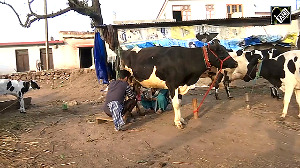
India's Ambassador to Kuwait Swashpawan Singh says contingency plans have been drawn up to cope with the impact of any forthcoming conflict with Iraq.
In an exclusive interview with rediff.com Senior Editor Shyam Bhatia in Kuwait he says 330,000 Indians make up the single largest expatriate group of foreigners in the country, adding that the community is comparatively relaxed because so many Indians have prior experience of the 1990 Iraqi invasion.
Could you give us some idea about the size of the Indian community here in Kuwait?
According to Kuwaiti figures there are about 330,000 Indian nationals in Kuwait. That figure represents a doubling of the original population as it was during the invasion in 1990. There are just over a hundred associations representing a whole range of cultural activities affecting interests in different aspects of Indian culture, dance, music, culture. Some are regional, some cross regional, but that is not unusual given that you have such a sizeable community and a community that is steadily growing..
In terms of the profile there are a substantial number in the services sector, which is household, as well as individuals without families who work in factories and the oil industry, the private sector. Then we have professionals, doctors, university professors, a very large nursing staff mainly from Kerala. People also in IT, accountancy, financial services, restaurants, catering, you name it.
It is the largest expatriate community in Kuwait.
Is this the single largest community in the Gulf?
No, Saudi Arabia is the largest, which is almost 1.5 million. There are about 1.2 to 1.3 million in the UAE. But after these two Kuwait would be the largest.
How has the prospect of war impacted on the community?
About 150,000 from our community were there in 1990 when the invasion took place. Most of them returned after the liberation when they had the opportunity to do so. So their mindset seems a lot more relaxed this time because they have lived through that. But there is concern naturally about the prospect of hostilities, retaliation, concerns with sources of livelihood. There is a level of anxiety, but there is no great rush of people wanting to get away.
We don't expect too many people to leave. The majority of people will stay. The Kuwaiti government has been very positive about this. They have made very good arrangements, there have been public announcements to say the arrangements they have made will be for all residents, irrespective of nationality. That has been very reassuring with shelters and various other facilities.
What contingency plans has the embassy made for evacuation?
All missions all round the world prepare contingency plans; this is not something that gets done when a situation of this kind happens. But the contingency plans take into consideration the possible threat perceptions, the size of the community and various contingencies. We are reasonably confident that the facilities the host government will provide will suffice.
But we have supplemented them with a contingency plan of our own involving our own community, also involving some physical assets that are here like our Indian schools. Should it become necessary for us to hold small groups of people when they get displaced and look after them for short periods of time before alternative arrangements are made, those plans have been made.
Those places would be like shelters, basically places where we could hold people. Our own community will help us as they did in 1990. In 1990 the community did excellent work, not just in getting people together, giving them food and medical supplies, but also arranging physical transportation in buses all the way to Baghdad and Amman. To shift 120,000, 130,000 people is an enormous task and they did a great job.
A lot of that managerial talent is till available to us. We have been in touch with senior members of the community, we constituted various sub committees, we have various arrangements in place. We hope we won't need them, but should it become necessary, these will supplement the arrangements that the host government is making.
In 1990 leaving by land via Iraq, Turkey and Jordan was an option. That is not the case now, is it?
This time the only physical access route naturally has to be through Saudi Arabia. There are two very good highways and from there Dhahran, Dammam are possible options. Bahrain, UAE, Riyadh, any number of options. But we must be aware that the total size of the expat community here is very large. If we are 340,000, we have very sizeable Egyptian, Bangladeshi, Egyptian, Sri Lankan, Filipino, Pakistani communities also. It will be large numbers and we will have to leave it to our host governments really to regulate this.
Let us be clear: If so many people wish to leave all at once, it is not physically possible to do it. Also, if they have to go into Saudi Arabia at some point, then it must be with the full support and cooperation of the Saudi government. Then there are issues relating to travel documents, visas etc.
It took almost two months for 150,000 to depart at the time of the invasion. Now we are talking about much larger numbers.
What about gas masks?
Masks are supposed to be in the pipeline, they should be available. There has also been news that they are going to issue ration cards for families so they can buy their requirements at controlled prices. This time round there will be very much a government in place managing law and order and looking after security. If there is an emergency they have done a fair amount of drilling. They have got their squads ready. People are hoping nothing will happen, but if it should happen they will be ready to deal with it.
Have there been any specific arrangements to protect against chemical attack?
Where chemical and biological attack is concerned, in real terms there is no real protection against it because the kind of protection you can get would require very elaborate items, like body suits, disinfecting elements, antidotes. You need a whole range of stuff. It is the kind of stuff made for armed forces personnel who cross the border.
For the civilian population most often they talk about common sense precautions, isolating a room, having charcoal, sealing the room, switching off the air conditioning, this kind of thing. As a fall back, perhaps also a gas mask, although a gas mask is no guarantee against it. It depends on how intense the attack is, how far away you are from the radius of the contamination. But where the gas mask helps is it can buy you time to physically relocate should you be in an area where the intensity is not very serious.
I think most people will make an effort to acquire gas masks when they become available. We hope we never get to use them.
Has your contingency planning included linking up with Air-India and Indian Airlines?
We have been in touch with them. Their regional directors have visited Kuwait. We are also in touch with concerned authorities in India. I also think that if extra flights should become necessary, we would have no difficulty in getting them. There are about 80 flights a week out of Kuwait to India: Indian Airlines, Air-India, plus all the other airlines put together, which gives us a sizeable seat capacity of about 17,000 a week, which is sizeable.
Should it become necessary to get extra flights, we have over 180 flights weekly to the Gulf and these destinations, Doha, Bahrain, Kuwait, Saudi Arabia, these are very, very close to each other. I don't think this should be much of a problem.
We also have enormous expertise in moving large numbers of people because, as you know, India organises Haj for almost 100,000 pilgrims every year. The 100,000-odd travel by air and a virtual air bridge is put on. Indian Airlines, Air-India and Saudia get together to do this Haj, so we have enormous expertise and knowhow. If it becomes necessary, we are very confident that India Airlines, Air-India plus Kuwait Airways and other airlines will be able to provide necessary facilities.
Have you scheduled any meetings with community leaders in the weeks ahead?
We have been meeting with our community regularly. We have a co-ordination format in which we meet representatives of associations on a regular basis. In addition we have organized meetings with smaller groups, we met with schoolteachers and school principals. We keep in very active touch with the community and we will continue to keep in touch with them. We are concerned about their well being.
Obviously, this is a time when they have anxieties and concerns. We will definitely keep in touch on a regular basis to share with them our assessments and to keep them informed about developments that the local government is making.
I must tell you the local government has been very forthright, there have been special meetings for the entire diplomatic community with their civil defense people. They have a committee on which their foreign office is represented and we have full access to that. They have also encouraged expats to register as volunteers with the civil defense department. We have encouraged our community to do that. We know several of them have undergone training.
If people are obliged to leave Kuwait because they have no option, are arrangements in place back home in India to permit extra weight allowances on aircraft, customs waivers on dutiable items and so on?
It will depend on the circumstances. If there are forced departures, we will work closely with our host government.
As you are aware all movements within Kuwait to go elsewhere depends on the circumstances. If the airport is open its one set of options. If it is not, we will have to think of other options. Once a situation arises where our people want to leave, either voluntarily in large numbers or for circumstances in which they have to.
If they have to evacuate as you know what happened in 1990 150,000 were evacuated and our government provided all kinds of facilities. When people reached back home they were received, food was made, voluntary organisations stepped in. Connections to other stations were arranged. For a large number they were never asked to pay for air tickets, etc.
If it is an emergency situation, our government, NGOs and others have always been very forthcoming, very accommodative. I don't see a problem at all. If anything we will see them going out of their way to welcome back our people.
There are rumors in the marketplace about the imminent devaluation of the Kuwaiti dinar and how it would affect the Indian community's savings. Are you aware of these concerns?
The Kuwaiti economy has done reasonably well this last year, largely because of oil prices. There has also been money that has come from the UN by way of compensation. You can see the Kuwaiti stock exchange is doing reasonably well. So I don't see any danger of devaluation of the Kuwaiti dinar. They have linked it to the dollar and fixed it within a certain range. But a lot will depend on how the situation evolves.
There seems to be a fair amount of optimism that if the situation evolves and the manner in which Iraq returns to normal functioning within the international mainstream, it will mean enormous economic opportunities for Kuwait. If that should happen, the Kuwait economy will benefit.
Have any anti-Indian sentiments been expressed in Kuwait because New Delhi is seen as being pro-Baghdad?
We have had a very old and good relationship with Kuwait. We have no political differences with them. In fact, the Kuwaiti older generation, particularly members of the ruling establishment, have very strongly felt and expressed views about the warm, close relations with India. There is a saying here that Kuwaitis have always looked to India as another home, another place they went to make good long before oil.
There are several families, important merchant families who still have strong links. The average Kuwaiti, including the establishment, looks upon the relationship with India very positively. We are the community of first preference. The fact that we have such large numbers welcome and living here peacefully is an indication. There is an understanding that looking ahead in terms of Kuwait and India's relationship, both sides are working towards creating a special strategic relationship in economic terms.
Design: Uttam Ghosh






 © 2025
© 2025